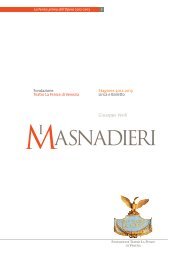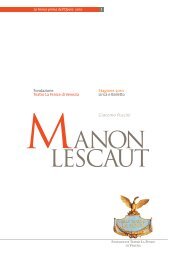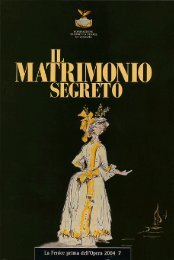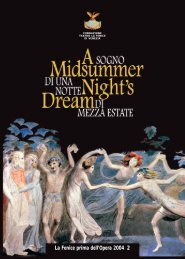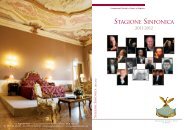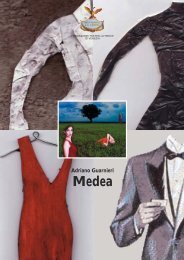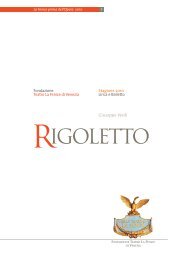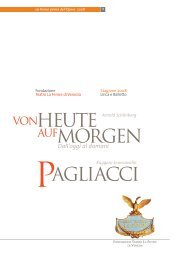[PDF] Otello press comunication - Teatro La Fenice
[PDF] Otello press comunication - Teatro La Fenice
[PDF] Otello press comunication - Teatro La Fenice
Create successful ePaper yourself
Turn your PDF publications into a flip-book with our unique Google optimized e-Paper software.
FONDAZIONE TEATRO LA FENICE<br />
<strong>Otello</strong><br />
venerdì 16 novembre 2012, ore 19.00<br />
martedì 20 novembre 2012, ore 19.00<br />
giovedì 22 novembre 2012, ore 17.00<br />
sabato 24 novembre 2012, ore 15.30<br />
martedì 27 novembre 2012, ore 19.00<br />
giovedì 29 novembre 2012, ore 19.00<br />
venerdì 30 novembre 2012, ore 19.00<br />
prova generale 13 novembre 2012 ore 15.30<br />
LA FENICE<br />
http://www.teatrolafenice.it<br />
VERDI AND OR WAGNER<br />
AUTORIZZAZIONE DEL TRIBUNALE DI VENEZIA, 10 APRILE 1997, ISCR. N. 1257 REGISTRO STAMPA<br />
redazione tel ++39 041 786521 fax 786505<br />
http://www.facebook.com/<strong>La</strong><strong>Fenice</strong>ufficiale<br />
Tristan und Isolde<br />
domenica 18 novembre 2012, ore 15.30<br />
Direttore Myung Whun Chung<br />
Regia Paul Curran<br />
18/23/ 25/ 28 novembre - 01 dicembre 2012<br />
prova generale 14 novembre 2012 ore 17.00<br />
PRESS RELEASE Venice, September 2012<br />
<strong>Otello</strong> by Giuseppe Verdi<br />
On Friday 16th November, 2012 <strong>Teatro</strong> <strong>La</strong> <strong>Fenice</strong> will open its 2012-2013 opera season at 19.00 with a new production<br />
of <strong>Otello</strong>, an operatic drama in four acts by Giuseppe Verdi to a libretto by Arrigo Boito based on the same-named<br />
tragedy by Shakespeare. Verdi’s last tragic masterpiece, it debuted at <strong>Teatro</strong> alla Scala in Milan on 5th February, 1887.<br />
Followed on 18th November by the première of Tristan und Isolde, the evening is the first part of the double<br />
inauguration marking the two hundredth anniversary of the birth of Giuseppe Verdi (1813-1901) and Richard Wagner<br />
(1813-1883): this is a challenging dual production in which the two operas will be performed on alternating dates<br />
throughout the second half of November, with different casts and productions, but both conducted by the Korean<br />
maestro Myung-Whun Chung.<br />
Set in Venetian Cyprus at the end of the fifteenth century, <strong>Otello</strong> is the Venetian-themed homage that <strong>Teatro</strong> <strong>La</strong> <strong>Fenice</strong> is<br />
paying to two of the greatest composers of nineteenth century opera, in addition to Tristan und Isolde, which was<br />
partially inspired by the nocturnal atmosphere in the city, where Wagner lived whilst composing the second act.<br />
Director of this production of <strong>Otello</strong> is Francesco Micheli, set design by Edoardo Sanchi, and costumes by Silvia<br />
Aymonino; it will go on tournée in April to Japan for the opening of the new Osaka Festival Hall and then be performed<br />
in the Courtyard of the Doge’s Palace during the Festival ‘Lo spirit della musica di Venezia’ [The Spirit of Music in<br />
Venice].<br />
The cast includes Gregory Kunde alternating with Walter Fraccaro as <strong>Otello</strong>, Leah Crocetto alternating with Carmela<br />
Remigio as Desdemona, Lucio Gallo alternating with Dimitri Platanias as Jago; Cassio will be sung by Francesco<br />
Marsiglia, Roderigo by Antonello Ceron, Montano by Matteo Ferrara, and Emilia by Elisabetta Martorana. The <strong>Teatro</strong><br />
<strong>La</strong> <strong>Fenice</strong> Orchestra and Choir (choir master Claudio Marino Moretti) will be supported by the trebles of the Piccoli<br />
Cantori Veneziani, conducted by Diana D’Alessio.<br />
https://twitter.com/#!/<strong>Teatro</strong><strong>La</strong><strong>Fenice</strong>
The première on Friday 16 th November, 2012 will be followed by a further six performances, Tuesday 20 th at 19.00,<br />
Thursday 22 nd at 17.00, Saturday 24 th at 15.30, Tuesday 27 th , Thursday 29 th , and Friday 30 th at 19.00.<br />
Tickets for the performances are on sale at prices ranging from 15 to 220 euros (between 30 and 500 euros for the<br />
première on 16 th November) at the Hellovenezia ticket offices (<strong>Teatro</strong> <strong>La</strong> <strong>Fenice</strong>, Piazzale Roma, Tronchetto, Lido,<br />
Mestre, Dolo, Sottomarina), through the telephone ticket office (041 2424), on-line ticket office (www.teatrolafenice.it)<br />
and via fax (041 2722673).<br />
Verdi’s last two operas, <strong>Otello</strong> (1887) and Falstaff (1893), are exceptional cases: they are the absolute masterpieces of<br />
their genre and for various reasons are not part of the contemporary framework. In fact, not only are these works the<br />
result of the cultural and stylistic stimuli that led Verdi to expand the horizon of Italian opera to European levels in the<br />
‘70s – ‘80s but they are also the final achievement of the composer’s creative development.<br />
After 1871, the year of Aida, he seemed to have almost stopped composing: although he was always working on<br />
something – in addition to composing the Requiem he also revised Simon Boccanegra in 1881 and the Italian version of<br />
Don Carlos in 1884 – he himself had said he wanted to end his own career. Luckily, however, Aida was not his least<br />
operatic masterpiece as his reluctance was overcome by a shrewd move of ‘encirclement’ by Giulio Ricordi. In this, the<br />
publisher involved Arrigo Boito, the unchecked anti-academic who was not only a controversial figure owing to his<br />
reactions to Italian literary tradition and his librettos for Verdi: with <strong>Otello</strong> and Falstaff, as well as his own Mefistofele<br />
Boito had opened up new ex<strong>press</strong>ive worlds to the archaic panorama of Italian libretto writing, by offering more up-todate<br />
contents and trying his hand at bold experimental and asymmetrical models.<br />
In all likelihood, Boito’s ‘return to Canossa’ would not have had the desired effect if he had not struck a chord that Verdi<br />
considered fundamental: William Shakespeare. The drama model of this genius of Elizabethan theatre had incessantly<br />
accompanied Verdi’s career, both directly in works that were linked to plays by the playwright (Macbeth, and later <strong>Otello</strong><br />
and Falstaff) and in the lengthy mediation of King Lear, exemplum maximum of tragic characterisation and tightly-knit<br />
construction of dramatic rhythm.<br />
After almost fifteen years of Shakespearian discussions, <strong>Otello</strong> was finished at the end of 1886 and met with resounding<br />
success at the Milan Scala on 5 th February, 1887. It was also thanks to Boito’s provocative stylistic innovation that the<br />
music Verdi composed for the famous tale of love and jealousy was equally original. Here he experimented with the<br />
structural principal of the ‘open’ form, with an extremely ductile sonoral course in which motif fragments are interwoven<br />
in a constant, iridescent melodic path that accompanies the action and psychology of the characters with blinding<br />
intensity and adherence. Some believe this opera to be a sort of capitulation by Verdi to the Wagnerian model, without,<br />
however, understanding that it is the extreme result of a highly personal dramatic conception, the roots of which are to be<br />
seen in Verdi’s earliest works.<br />
AUTORIZZAZIONE DEL TRIBUNALE DI VENEZIA, 10 APRILE 1997, ISCR. N. 1257 REGISTRO STAMPA<br />
redazione tel ++39 041 786521 fax 786505<br />
http://www.teatrolafenice.it<br />
http://www.facebook.com/<strong>La</strong><strong>Fenice</strong>ufficiale https://twitter.com/#!/<strong>Teatro</strong><strong>La</strong><strong>Fenice</strong>


![[PDF] Otello press comunication - Teatro La Fenice](https://img.yumpu.com/16064258/1/500x640/pdf-otello-press-comunication-teatro-la-fenice.jpg)
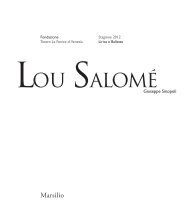
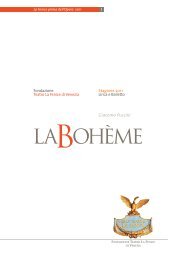
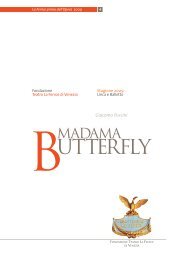
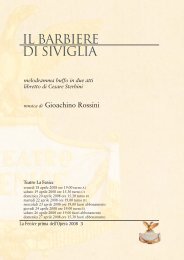
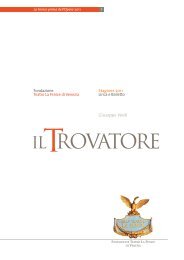
![[PDF] Vedi documento - Teatro La Fenice](https://img.yumpu.com/16094697/1/184x260/pdf-vedi-documento-teatro-la-fenice.jpg?quality=85)
